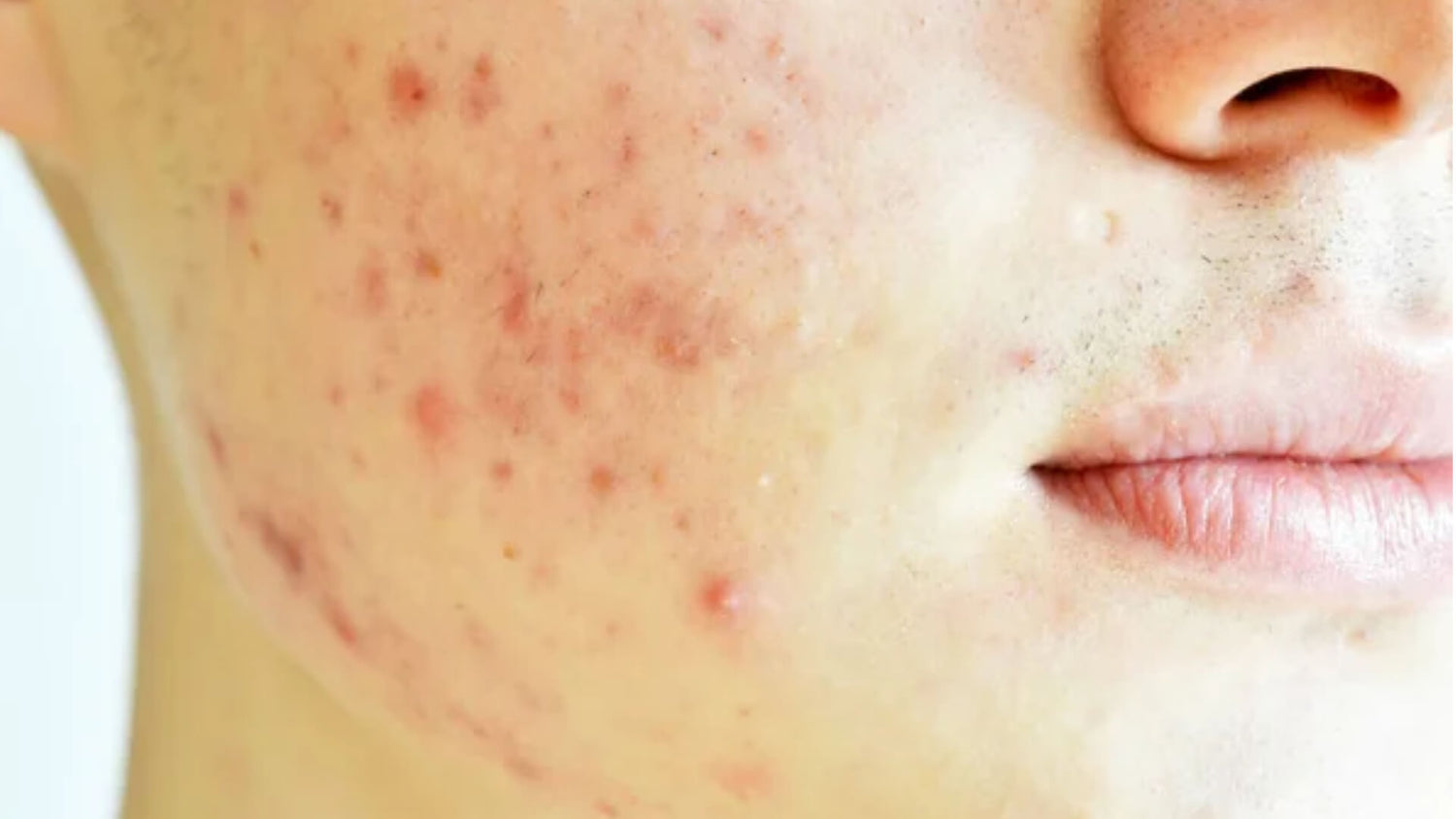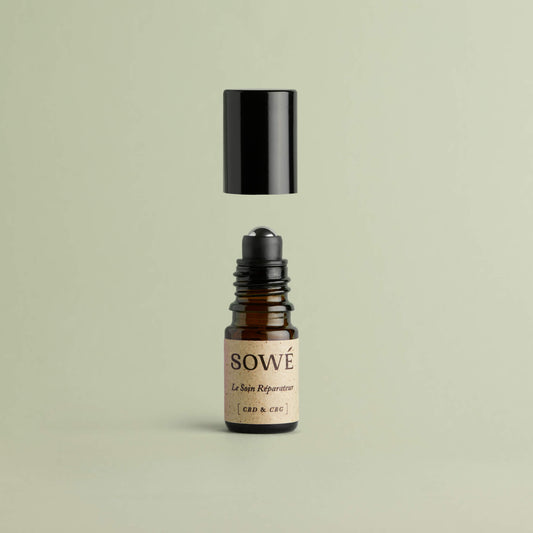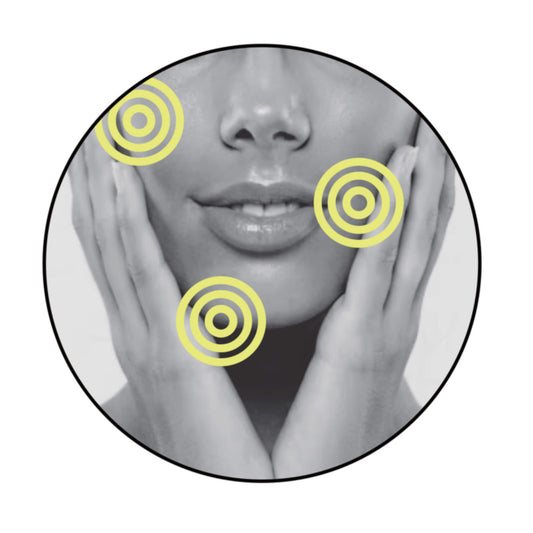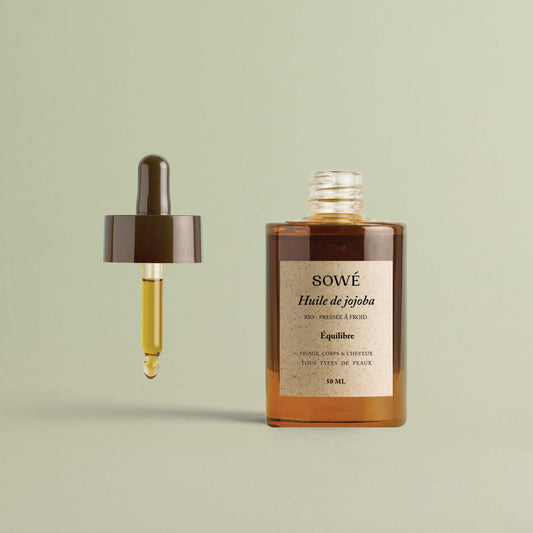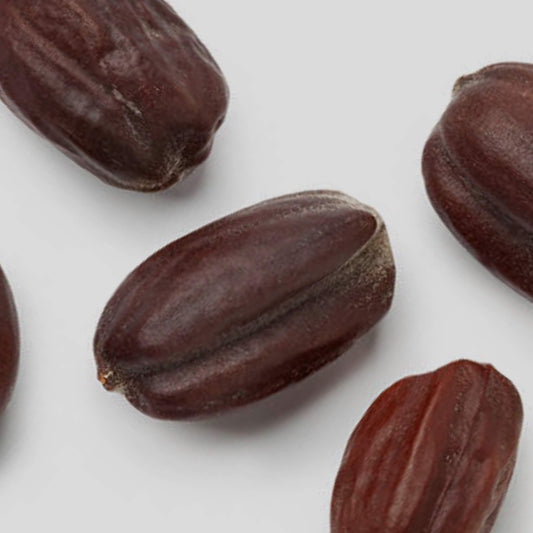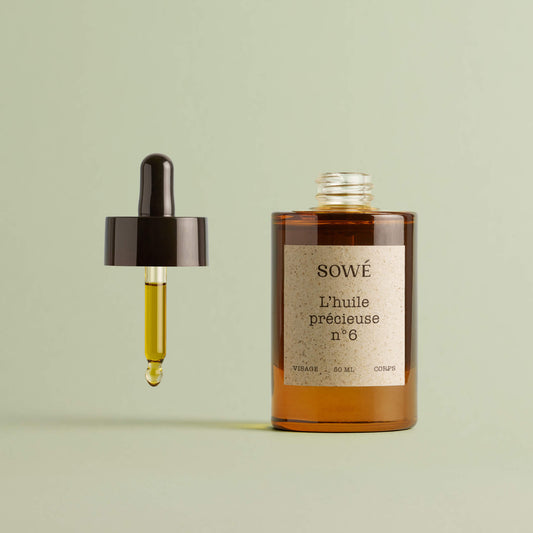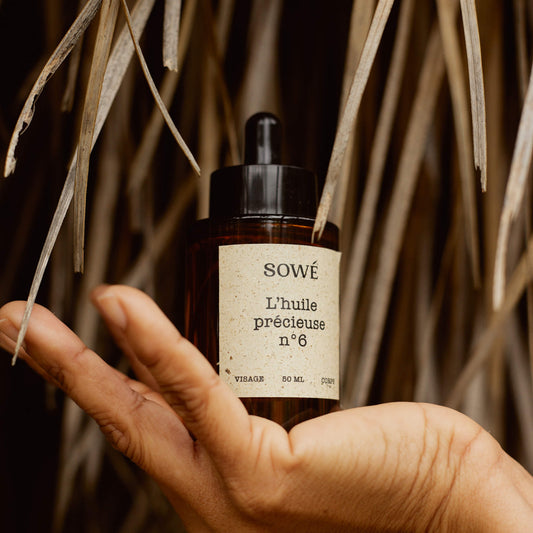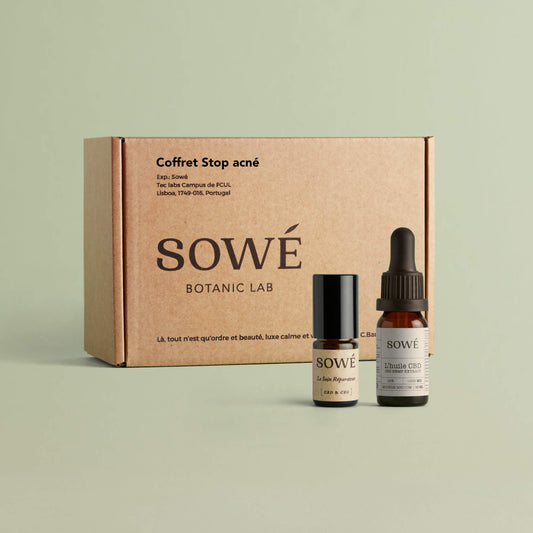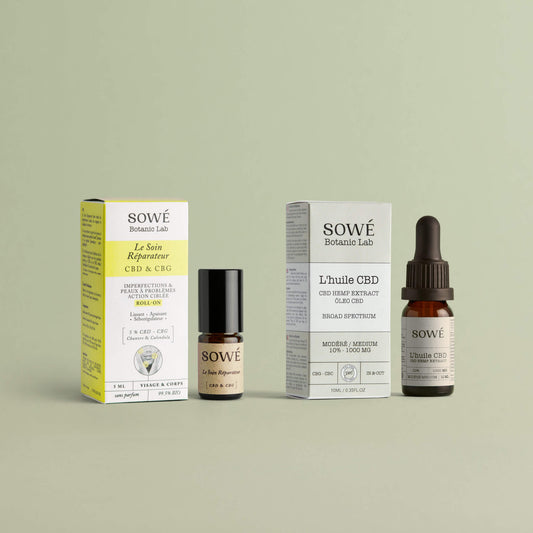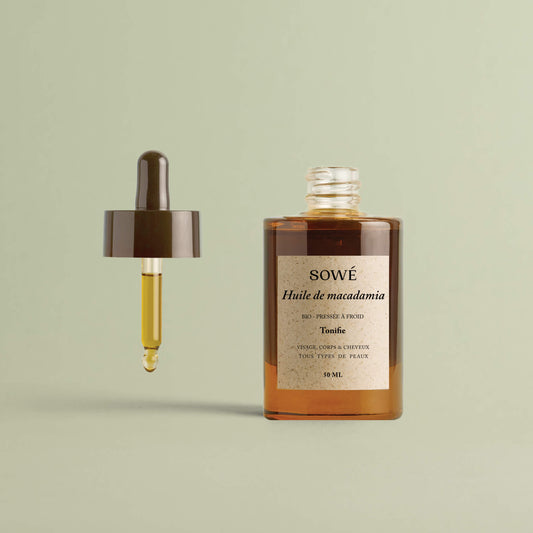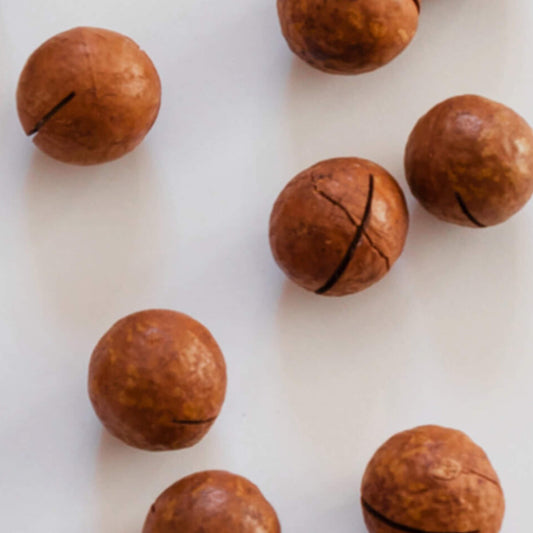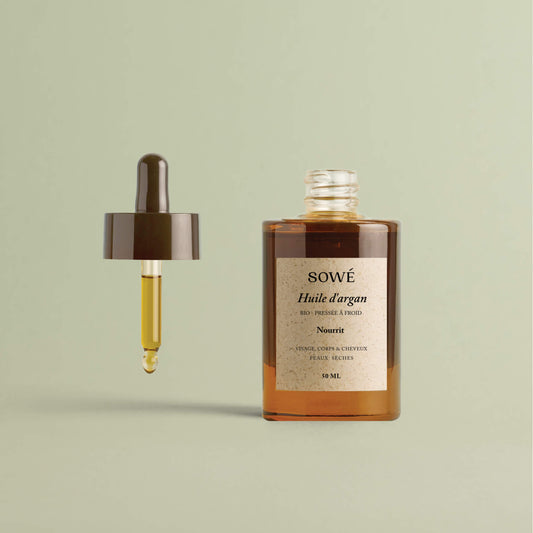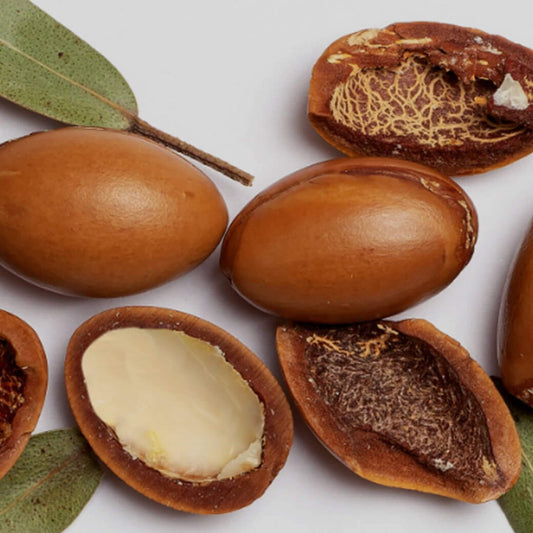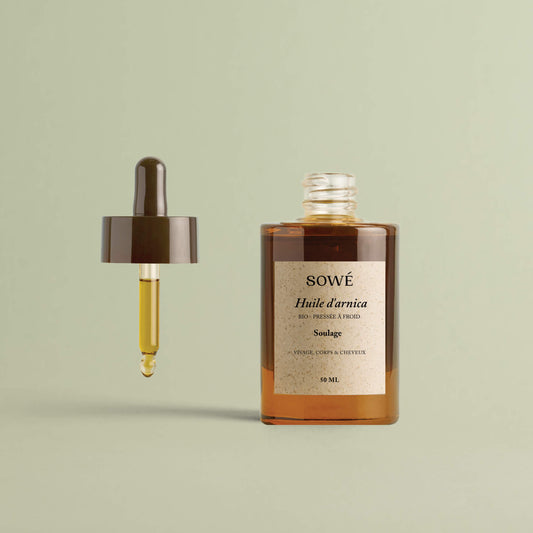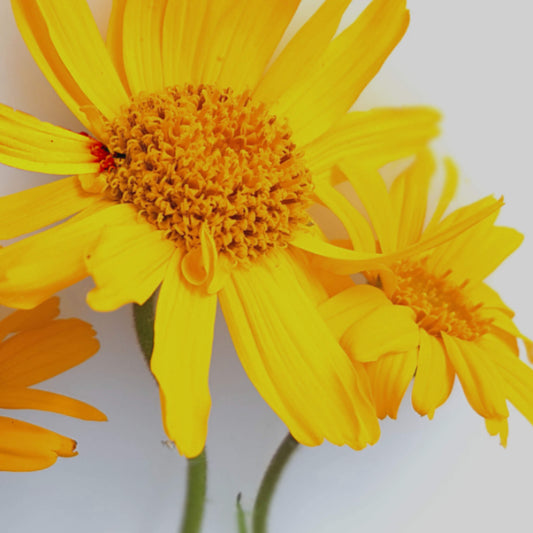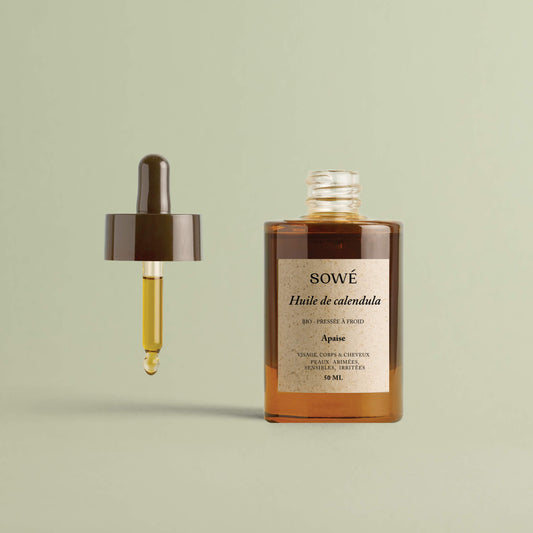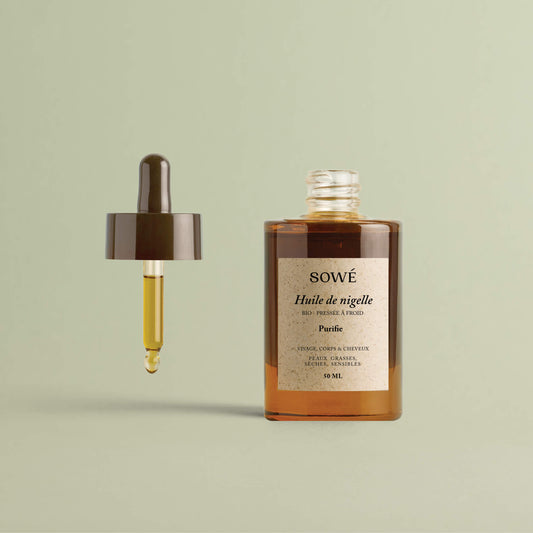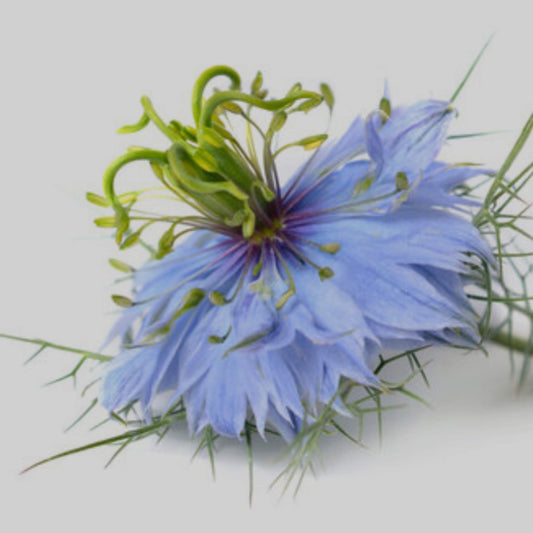CBD and acne
Acne, what is it?
Acne is an inflammatory skin disease. Its appearance is due to hypersecretion of sebum which obstructs the sebocyte channels. Because the pores are blocked, the skin becomes oily and inflammation can appear in the form of painful red or white pimples and blackheads. This chronic skin disease generally affects adolescents and young adults between 12 and 20 years old, but not only. In fact, 40% of people in their thirties and early forties suffer from acne, particularly women. Depending on its severity, acne can cause emotional distress and leave scars on the skin. The sooner you start the treatment, the lower is the risk of such problems.
Causes of acne
There are many causes of acne:
• Stress and hormonal changes
• Pollution, cigarettes, alcohol
• Unbalanced diet
• Heredity
• Use of comedogenic products (our oils are all NON-comedogenic)
• Exposure of the skin to thermal shock as well as humidity.
These induce an overproduction of sebum by our sebaceous glands (sebocytes). When sebum mixes with pollutants like dead skin or other pathogenic bacteria and becomes trapped in a pore. Irritation then occurs.
Different forms of acne
Retentional acne
Also called mild acne, retentional acne begins at puberty. Very common among adolescents, it manifests itself by the appearance of microcysts, closed comedones, blackheads, dilated pores and by oily and shiny skin. It is the result of overproduction and accumulation of sebum often generated by hormonal variations and stress.
Inflammatory acne
Inflammatory acne can coexist with retentional acne. It is caused by the abnormal proliferation of the bacteria cumacterium acnes. This bacteria promotes the occurrence of inflammatory acne lesions or the development of retentional acne lesions. Pimples are generally located on the T-zone of the face, jawline, neckline and back.

Cystic acne
Cystic acne is a form of severe acne whose appearance is due to a hormonal imbalance. It is generally the most resistant and painful form of acne. It is characterized by blackheads, comedones, red spots which evolve into deeper lesions, cysts and microcysts.
Acne Severity Levels
We speak of mild, moderate or severe acne, but to assess the severity of acne, there are 5 grades established by the SFD (French Society of Dermatology).
- Grade 1: Very mild acne with few lesions, rare comedones and scattered papules.
- Grade 2: Mild acne characterized by a small presence of open or closed comedones as well as papulo-pustules on part of the face.
- Grade 3: Medium acne with numerous comedones and papulo-pustules. Lesions extend over a large part of the face.
- Grade 4: Severe acne, characterized by the presence of numerous papulo-pustules, open or closed comedones as well as a few nodules all over the face
- Grade 5: Very severe acne, highly inflammatory, presence of nodules all over the face.
To determine your situation, we advise you to consult a dermatologist.
Skin and CBD
The skin produces endocannabinoids (2-AG and AEA) which are synthesized in the cells of the epidermis, hair follicles and sebaceous glands and will attach to the CB1 and CB2 receptors, present in many tissues and organs of the human body.
Research indicates that CB1 and CB2 receptors are also present in epidermal keratinocytes, cutaneous nerve fibers, dermal cells, melanocytes, eccrine cells and skin cells, cutaneous nerve fibers, dermal cells, melanocytes, eccrine sweat glands and hair follicles, as shown in the diagram below.
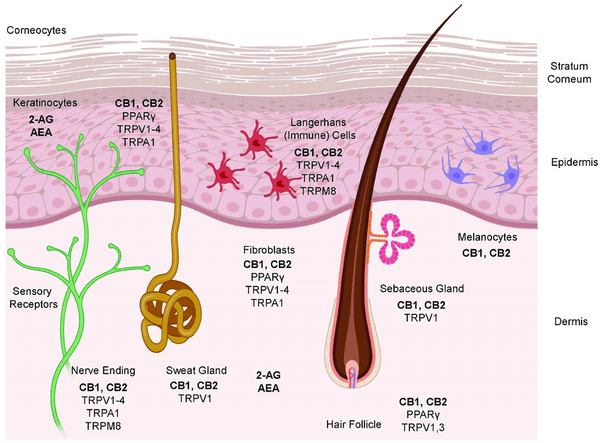
A growing number of studies place CBD and other phytocannabinoids as key ingredients in acne treatments. The lipostatic, antiproliferative and anti-inflammatory properties of CBD are now recognized for their ability to activate the receptors of the endocannabinoid system and more precisely CB2, but its anti-bacterial action also makes it a great ally for treating these skin problems. .
Acne and CBD: how does CBD work?
Acne and seborrhea are the most common dermatological disorders, both characterized by high production of sebum (lipids) by the sebaceous glands (SG).
These glands play a central role in the regulation of cutaneous lipid homeostasis and in the development of the physical and chemical barrier. Dysregulation of the sebaceous glands can lead to hypersecretion of sebum, leading to hyperproliferation of keratinocytes and sebocytes, and concomitant colonization by bacteria in the blocked pilosebaceous unit, thereby causing skin lesions responsible for acne.
By binding to ECS receptors, cannabidiol has been suggested as a promising therapeutic agent for the treatment of acne, because according to studies:
- CBD normalizes the expression of pro-inflammatory cytokines (anti-inflammatory effect)
- CBD normalizes the lipogenesis of sebocytic cells (lipostatic effect, without compromising cell viability)
- CBD reduces the proliferation of these cells (antiproliferative effect without inducing sebocyte apoptosis)
- CBD exerts a sebostatic (lipostatic and antiproliferative) action by activating TRPV4 receptors, therefore considerably reducing sebum production.
In addition, its anti-inflammatory properties have a soothing effect which can calm irritations due to inflammation of cysts and microcysts and create a barrier protecting the skin from external aggressions.
Numerous studies attribute undeniable effectiveness to CBD as an anti-inflammatory on several levels:
- By blocking macrophage migration (digestion of foreign particles and pathogens)
- By regulating the activation of lymphocytes (recognition and destruction of foreign cells)
- By inhibiting the release of pro-inflammatory substances
- By promoting the release of other anti-inflammatory substances called “Cytokines”.
Furthermore, cannabidiol can inhibit the activity of an enzyme (FAAH) involved in the degradation of anandamide, one of the endocannabinoids synthesized by the human body. This substance is also an agonist (activator) of the TRPV1 ion channel receptor, and an antagonist (blocker) of the TRPM8 ion channel receptor, involved in thermal sensitivity and certain pains.
In conclusion, it is therefore by acting on the sensors of the endo-cannabinoid system, playing a key role in the homeostasis of the skin, and in particular in the lipogenesis of sebocytes, that CBD proves its effectiveness in treating acne. .
To discover the other effects of CBD on the skin, we invite you to read our article on the subject.
A clinical trial from December 11th, 2021, where the effect of a topical solution containing up to 5% CBD was evaluated and compared to a placebo in more than 360 acne patients shows a 40% reduction in l acne after 12 weeks of treatment without any adverse effects being observed.
In conclusion, targeting the skin's ECS can help regulate sebum production and have therapeutic effects on both acne and seborrhea without adverse effects.
What do we offer?
In case of grade 1 to 2 acne, simple and regular use of one of our skincare l'Huile précieuse containing 500 mg of CBD is recommended. It fits easily into a classic skincare routine. The duration of its action on the sebo-regulation and acne of your skin is remarkable and will act easily at night, as if you were using a simple serum.

In case of grade 3 to 5 acne, our Roll-On Repair Treatment will be your best ally. Applied in a targeted manner, its high concentration of broad-spectrum CBD and CBG will strongly contribute to eliminate your skin's imperfections by balancing your sebum production while providing you with deep hydration and an instant sensation of soothing and freshness thanks to its massaging applicator.

In addition, a high concentration CBD Oil, 20 or 30%, can be applied to the skin to treat areas of your skin with severe acne.

Other alternatives to relieve acne?
To combat irritation
Baobab and argan oils are respectively known for their anti-inflammatory and regenerative properties. Numerous studies demonstrate the effectiveness of these oils in the treatment of skin problems such as acne, because they soothe the skin and boost the regeneration of skin cells. You can find these oils in our precious oils and in higher concentration in l'Huile précieuse n°2 and Precious Oil No. 4.
To fight against hyperproduction of sebum
-
Jojoba oil is perfect for regulating sebum production. It is one of the major ingredients contained in l'Huile précieuse n°1.
-
Macadamia oil is rich in palmitoleic acid present in human sebum, so it helps prevent the overproduction of sebum. You can find this oil in particular in Precious Oil No. 2 and No. 3 where it is present in large quantities.
Sources
- Acne: causes, symptoms and progression . (2021, December). Ameli.
- Effects of CBD on the skin . (2022, March). BioMeca.
- Johnson, J. (2019, March). Can CBD oil get rid of acne? Medical News Today.
- Nall, R. (2019, July). Can CBD Help Treat Acne?
- Learn all about the different types of acne and how to recognize them . (nd). Bioderma.

